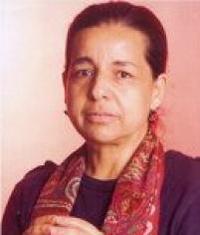
MoulayYusef ben Hassan, born in Meknes on 1882 and died in Fes in 1927, was the 'Alawi sultan of Morocco from 1912 to 1927. He was the son of Hassan I of Morocco, who was the son of Muhammad IV of Morocco.
A total of eleven women are confirmed as having been married to Muhammad, the messenger of Islam. As a sign of respect, Muslims refer to each of these wives with the title Umm al-Muʼminin, which is derived from 33:6 of the Quran.

Al-Kahina, also known as Dihya, was a Berber warrior-queen of the Aurès and a religious and military leader who lived during the seventh century AD.

At-Taḥrīm is the 66th Surah or chapter of the Quran and contains 12 verses (ayah). This Surah deals with questions regarding Muhammad's wives.
The Arabic chat alphabet, Arabizi, Arabeezi, Arabish, Franco-Arabic, 3arabizi,or simply Franco refer to the romanized alphabets for informal Arabic dialects in which Arabic script is transcribed or encoded into a combination of Latin script and Arabic numerals. These informal chat alphabets were originally used primarily by youth in the Arab world in very informal settings—especially for communicating over the Internet or for sending messages via cellular phones—though use is not necessarily restricted by age anymore and these chat alphabets have been used in other media such as advertising.
Umāma bint Abī al-ʿĀṣ ibn al-Rabīʿ, was a granddaughter of the Islamic prophet Muhammad and Khadija, via their daughter Zaynab, and is thus also known as Umāma bint Zaynab. Muhammad was her maternal grandfather, and thus she is a member of his Ahl al-Bayt. She is also numbered among the Companions of the Prophet.
French names typically consist of one or multiple given names, and a surname. One given name, usually the first, and the surname are used in a person's daily life, with the other given names used mainly in official documents. Middle names, in the English sense, do not exist. Initials are not used to represent second or further given names.
Mohamed Choukri was a Moroccan author and novelist who is best known for his internationally acclaimed autobiography For Bread Alone, which was described by the American playwright Tennessee Williams as "a true document of human desperation, shattering in its impact".
Rita El Khayat also known as "Ghita". Ghita El Khayat,, is a Moroccan psychiatrist, anthro-psychoanalyst, writer, and anthropologist. She studied at modern schools of Rabat and completed her graduation in the field of Psychiatry, Psychoanalyst and Medical Aerospace from Paris whereas graduation in Ergonomics and Occupational Medicine were completed from Bordeaux. She did her PhD in Anthropology of Arab World from.

Arabic, particularly the Moroccan Arabic dialect, is the most widely spoken language in Morocco, but a number of regional and foreign languages are also spoken. The official languages of Morocco are Modern Standard Arabic and Standard Moroccan Berber. Moroccan Arabic is by far the primary spoken vernacular and lingua franca, whereas Berber languages serve as vernaculars for significant portions of the country. According to the 2024 Moroccan census, 92.7% of the population spoke Arabic, whereas 24.8% spoke Berber languages.

Moroccan Ladies is a monthly women's magazine published in Arabic, English, and French in Casablanca, Morocco.
Aisha bint Abi Bakr was a seventh century Arab commander, politician, muhadditha, and the third and youngest wife of prophet Muhammad.
Asmāʾ bint Abī Bakr nicknamed Dhat an-Nitaqayn was one of the companions of the Islamic prophet Muhammad and half-sister of his third wife Aisha. Her nickname Dhat an-Nitaqayn was given to her by Muhammad during the migration to Medina. She is regarded as one of the most prominent Islamic figures, as she helped Muhammad during the Hijrah from Mecca to Medina.

Abdellah Taïa is a Moroccan writer and filmmaker who writes in the French language and has been based in Paris since 1999. He has published nine novels, many of them heavily autobiographical. His books have been translated into Basque, Dutch, German, English, Italian, Portuguese, Romanian, Greek, Spanish, Swedish, Danish and Arabic.

The history of women in Morocco can be divided into periods: before, during, and after the arrival of Islam.
Munira A. Al-Fadhel is a Bahraini poet, editor, writer and academic.
Aisha Abdurrahman Bewley is a convert to Islam and author or translator of many books on Islam. The WorldCat union catalog lists her as author or translator for "73 works in 172 publications in 3 languages and 855 library holdings". She and her husband collaborated on an English translation of the Qur'an.
Fawzia Abd Al-Minem Al-Ashmawi is an Egyptian academic, writer and translator. She works as a Professor of Arabic Literature and Islamic Civilisation in the University of Geneva. She had won the Golden Award in Sciences and Arts from Egypt.
While women have made considerable contributions to linguistics before it became an independent academic discipline, these early achievements have often fallen into oblivion. Their work has been lost or become untraceable and their authorship has been challenged. They have not been given recognition when collaborating with male scholars, or had to publish anonymously due to gender bias. While, at times, their contributions were left unpublished, the passing of time in other instances erased the memory of what they did publish. Moreover, in case the memory of these women has stood the test of time, it is often their academic, and particularly linguistic, achievements that do not live on.







